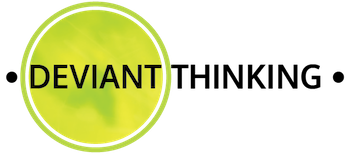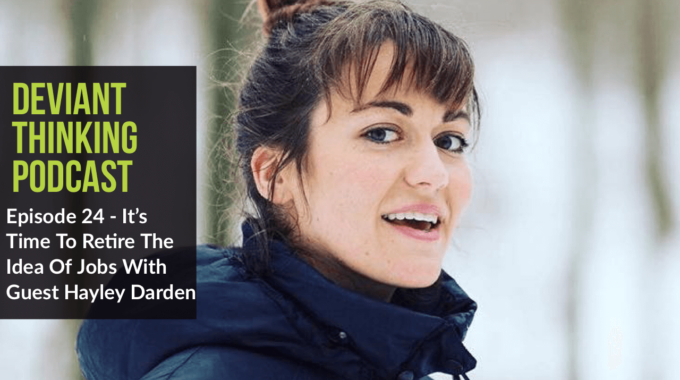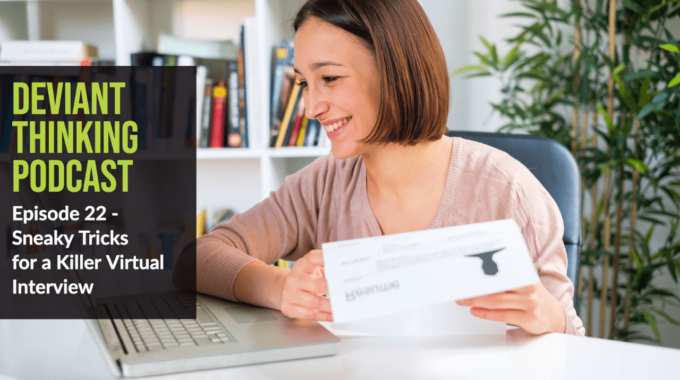CLICK HERE TO DOWNLOAD THE TRANSCRIPT (PDF VERSION) Jennifer Thompson 00:00 Welcome back to The…
CLICK HERE TO DOWNLOAD THE TRANSCRIPT (PDF VERSION)
00:00 Welcome back to The Deviant Thinking podcast. I’m your host, Jennifer Thompson. And today, and always, we will explore career advice that breaks the rules.
00:11 Today’s episode is dedicated to those of you who are out there searching for that new job in a new space. So whether it be someone who’s just graduating from an undergrad or a graduate program and looking for their first job in a new space, or if you’re already employed and looking to pivot your career and head in a little bit different direction, we’re going to talk about how to position your resume when you don’t have a ton of experience in the area in which you want to work.
00:53 Now before I get started today, I want to have a little shout out to Jan. Jan is a former online resume student of mine and it is because of her that I’m actually recording this episode this week. So, last week I got a great note from Jan, and it says that, “I used your resume course in 2017 and I’m over the moon happy with the results of your service. My new resume helped me land a part-time teaching position at Saddleback Community College, in their interior design department. I was wondering if you can suggest any information for my students to help them with their resume. They are newly emerging professionals, and they have little or no work experience, and how can we guide them on setting up an awesome resume?” So thank you, Jan, and thank you the students at Saddleback Community College. This episode’s dedicated to all of you.
02:03 And we’ll really dig in now and give you some really great ideas of what you can do when you don’t have a ton of experience but you’ve got to come up with a great resume. And for anyone who is a current student, or recent graduate, stick around, listen to the whole episode because at the end, I have a special bonus just for you. So let’s get started. So how do you position yourself and a great resume if you have little or no experience?
02:42 The first place I want to start is with you. What makes you different, what makes you exceptional, what makes you interesting and different from everyone else? It is that remarkable difference that will land you the right role. Will it land you every role? No. And you don’t want every role. You want a role that allows you to be you and show up fully as yourself. So that trumps every other piece of advice that I’m going to give you today about resumes. Be willing to be yourself and show up fully. Let people see your personality and who you are because that is awesome. And that’s what we want. Please don’t try to be ordinary. Don’t try to fit into a mold that someone made up that it’s made up anyway, it doesn’t really matter. Create your own mold and have the guts to be remarkably different, and just own it. So now that we’ve all agreed you’re gonna own it, you’re gonna stand out there and be remarkably different, and allow your personality to come through, we can get on with the details.
04:13 When it comes to resumes, the one thing I know is that you can’t fake experience. And what I mean by that is really, it is worth figuring out a way to get experience, even if you’re not already in that new position. If you are new to this, if you are an interior design student like jam students at Saddleback Community College, there’s opportunities for you to do interior design projects every day. Get out there and get experience. You may not be getting paid for it today, but any experience that you do, even if it’s volunteer work, and actually often if it’s volunteer work it’s actually seen as kind of even elevated from the work you do getting paid. So get out there, try things in your field and start to gain some experience. Internships are super important as well get out there and do great internships. And once you’re there and you’re doing the work, step outside the lines. Everyone gets a job description. Find out what that job description is, do it really, really well, and then ask what else you can do. Because people who are passionate about what they are doing, do more, they do more exciting work, they do work that is work that they can talk about. That’s work that accomplishes things. So don’t be afraid to step outside the bounds and do work.
05:52 When I was over at Creative Team, I often got asked to do informational interviews with people from other areas who were interested in coming into my department. And they would come to me and say things like, “Oh, I love what happens in in design, and, you know, I love to draw, and I love to paint and I can see myself doing this. What do I need to do to be successful and be able to move over to this team?” Often my answer was, “Well, can I see some of your work? What have you done? Like, what work do you do?” And often they never had work to show me. If you think you are passionate about something, you have to get out there and start doing the work, especially in the creative field, because it’s the only way someone can judge if you really are good at the work that you’re doing. Just writing down that you’re capable of it doesn’t mean that you really are. So they need that sense to really show your passion, get out there and do the work.
06:56 I often hear people say, “But I don’t have the time. I don’t have the capacity.” Your calendar and the way that you spend your time reflects your priorities. If transitioning your career into a new area, or starting a new career is your greatest focus, make sure your calendar shows that. And what I mean by that is, there’s always time to work
on projects that you love. I love the work I do. It is not crazy for me to be up at 4am recording a podcast, because I love the work that I do. I will find the time to do it. I will find the time to build a new product for my clients. I will find the time to do a great resume. And I will do that around all of the other work that goes with running a business. But the things that I’m passionate about, I make sure I find the time to do. So using time as an excuse to not be out there doing great work is not an excuse at all. It’s holding you back from being exceptional at the work that you do. So that’s the first thing that I would say is get out there and get experience so that you do have something to put on your resume because there is nothing that substitutes real work.
08:19 So now that I’ve told you exactly what you don’t want to hear, that there is no substitute for real work, I will share that often there is work that we do in other parts of our lives that can be translated to the new roles that we take. And if you’re someone who is in that career transition, often you are doing elements of the skills that you will need for that next role. And it’s really important to, kind of excavate those, dig into the jobs you’ve had in the past, and figure out when were those moments that you were doing these tasks and actions that fit the new career.
09:01 First place I always start, when I’m looking for these things is figuring out what you value, what’s important to you. So if you’re someone who’s creative, and you’re moving from a role and accounting to a true creative role, right, that’s a hard transition. But often what I find is that even for that person who was in accounting, maybe there was a special project they were put on, and maybe they were the one in charge of a volunteer project with a group of a children’s home. And you put together flyers and advertisements, and things like that to get people involved. Well, you were able to be creative, even outside the context of your normal roles and responsibilities. So really take that time and think about what are the skills that are needed in that next role, and where are some places that I can find those transferable skills, really again, focusing on what’s important to you because we always want to make sure what we put in our resume is the things that we love to do.
10:08 Which reminds me . . . if you are looking for general information on a resume and just good advice all around, check out our episode number seven (All About Resumes) will give you some great basics and some great tips. Now back to talking about that first resume.
10:30 One of the things I feel is important in that first resume is it really is that first marketing piece that someone will see to learn about you. So take the opportunity to make it a really beautiful document. Don’t settle for just a ‘plain Jane’ template. Get out there and find a beautiful, gorgeous piece, if you are in the creative field especially. This is the first chance they get to see how you do your work. Make sure you do it with excellence. Make sure it’s beautiful. Make sure it is a reflection of who you are. It’s really an opportunity to share your personal brand. What I mean by personal brand, is that extension of you, what do you look like on paper? I often, when I work with clients, I actually have them create style boards of themselves. I have them get on Pinterest, pin a few things, find some resume templates that they like, find images, find colors that they’re in love with. So they can really decide what their style is. And then we create the resume from that. Because I do think it’s important that it reflects who you are as an individual and really shows that design sense, especially in those creative fields.
11:57 Now if you’re in a more conservative field – say accounting – don’t be afraid there, also, to take this as an opportunity to show people who you are in a well rounded sense. It’s really worth sharing your image of who you are. So that again, they can get a good sense of you. Because when you don’t have a lot of experience to go with, you have to show them in other ways that you’re interesting. So a great format that really exemplifies who you are, can go a long way to people seeing you as a great professional.
12:32 The other thing that you can do on a resume is to tell your story. I am a big believer in the ‘About’ section. If you are in school right now, if you are going back to school, if you are transitioning, if you are learning new skills, that is an important story to tell. And I believe you can tell it in that ‘About’ section. So in the ‘About’ section, always start off with a little intro paragraph about who you are as an individual, and then share the story of why are you transitioning. Why is there something new? What are you excited about? What are you hoping to contribute going forward? That says so much about you that forward looking piece that an employer can say, “Oh, this is logical to me. I see why Jane, who was an accountant suddenly wants to come into a creative field. I see how she’s used education to move her there. I see how she’s used opportunities to work on different projects, so that then she can come forward and really show up as a professional in this new area.” So that ability for storytelling can really help move that resume along and get someone to understand who you are as a well-rounded individual.
13:55 The next piece of advice I have is don’t be afraid to use the work that you’ve produced while you’re in school. Tell people the stories of what you’ve done, put out the projects that you’ve worked on, just because they were school projects doesn’t make them invalid. If you’ve worked as a group to execute a really neat project, if you’re in a master’s program and you’ve created a thesis, trust me, that’s a full time job. Talk about who you partnered with, talk about the work that you completed, talk about the outcomes, talk about how you can have impact with those outcomes. All of those things really do count. So don’t be afraid to use the school work that you’ve done, to share that experience that you’ve had. Also, those extra curricular activities that you’ve done at school, those are great opportunities to show leadership and show involvement. If you’ve been in fraternities that are fraternities that support your area of study. Those are great things – honor sororities and fraternities, different clubs and organizations, again, different volunteer opportunities that you’ve done on campus. Great opportunities to share additional information.
15:23 Another area that you can highlight as a student is awards. If you have received any awards for the work that you have done, make sure that you highlight that. This is an easy way to show that others have already seen your work as exemplary, and that you should be noticed. So definitely be sure to put an awards area on your resume.
15:52 Another area that I find that new graduates and people transitioning often can highlight, are articles and information about their new profession. So if you are someone transitioning, and say you are someone who does Process Management now, and you want to go into the medical industry and maybe on the self-help side, start to publish articles about the work that you’re doing there and what you’re learning. You can publish them right on LinkedIn, I actually recommend that much more than I do a personal blog, because the opportunities to share it are much greater. Or put an article up on Medium and get noticed there. So start to establish yourself as an expert, give people advice in the area that you’re moving into.
16:47 To establish expertise in an area, the experts say it takes as little as 10 articles to establish that expertise. And well I don’t want my medical doctors claiming expertise with 10 articles, it does give us something to think about as individuals who are just starting out. We can gain a lot of traction and people can see our passion when we take the time to share articles and information of what we’re learning and how it can apply to others. So don’t be afraid to talk about and share what you’re learning as you go and, and the experiences that you have and the opinions that you have as well, because it will help establish you as someone who is passionate and interested in the field that they’re going into. And really, that passion goes a long way. When I talked to hiring managers, they will definitely hire someone who is passionate about their field over someone who has every idea buttoned up, but are kind of a little indifferent to it. “They know their stuff. Yeah. But I don’t know if I can see them in the future,” they, they say. You know, they want someone who really wants to show up, wants to be learning and wants to be sharing. So any way that you can do that is a benefit.
18:14 And as I share that, I know that’s not something that’s necessarily on your resume, but that can show up on your LinkedIn profile. So most employers kind of use both to look at you as an overall person. You definitely want your LinkedIn profile up to date as well. You want it to be consistent with your resume. There’s nothing worse than a resume that says one thing and a LinkedIn profile that says another. You want to make sure that all of that information is congruent between both sources. So definitely take advantage of LinkedIn. Join groups that are in your professional area. Get articles out there. ‘Like’ articles from others. Comment. Again, all of those things help to establish you as an expert in your field. And experts get hired. People who know things get hired. And again, while it’s off topic of exactly the resume, our real topic is how do you get hired, and getting hired means you have to be that expert.
19:23 And my last piece of advice for those of you who are developing that first resume, don’t be afraid to claim the experience that you have. And don’t think the projects that you’ve worked on aren’t important. Often I find that students and people in transition, have done projects in the area they’re looking to move into, be it through being interns, or doing it within their current role, and you want to make sure to highlight those areas. This is a little different than just describing your job description. But really what’s different because you were there.
20:06 I can think all the way back to my internship, and one of the projects I got to work on was establishing a design library for a Fortune 500 company. It allowed them to use
the works of art that they had purchased prior in new settings, saving them potentially hundreds of thousands of dollars. That’s how I would describe the fact that I photocopied and catalogued a whole bunch of pieces of art all summer. Might have been a boring job, but I actually did have an impact for the organization. And it’s that impact that I want to highlight, because I want people to know that I made a difference in the role that I was in.
20:50 So take a step back, think about the roles that you’ve had the internships, the jobs that you’ve done – if you’re a designer, and maybe you’ve picked up some freelance work along the way – and think about the impact that you’ve had with the work that you’ve done. If you’re a graphic designer and you’ve designed a new logo package, sure, it’s a logo package designed a logo. But if you can write it up as, ‘Designed a logo for a new startup coffee shop which set them up to be a hip, young spot in downtown Denver. Sales for the coffee shop were up 20% when the new graphics hit’. That’s impact. You can tell people what’s different because you were there.
21:37 So I really urge you to look at that experience that you already have, step back in another light, and really dig in and see what you can talk about for each of those pieces. So people can really see the impact that you have. And don’t sell yourself short. Really believe in yourself. Believe that the work that you’re done, you’ve done, is really valuable. And when you believe that that work is valuable, people looking at your resume will believe it’s valuable as well. And it will help you get a job. It will help you stand out and be remarkably different.
22:15 If I had one piece of advice from today’s episode that really stands out, it’s that please stand out, be yourself, be remarkably different. Don’t try to blend in. Don’t try to be ordinary at the expense of extraordinary. Stand out and be remarkably different.
22:39 Well, that wraps up another episode of The Deviant Thinking podcast. For those of you who are students – and stuck it out with me the whole way through today – I’ve got
a special offer. So any student who has either graduated in 2019 – so if you’re a class from May, or from the summer, or in December, or you’re currently enrolled in a school program. So if you are a student . . . if you will send me proof that you are a student – and probably the easiest way to do that is just go online to your school and snap a quick screenshot of your current enrollment or your graduation date and send me a picture of that – I will give you 50% off my online resume class. So that same class that Jan took that helped her land a fabulous job, I will offer to any student at 50% off.
23:37 And if you’re listening to this podcast a little bit after it comes out, don’t worry. I’m going to keep this offer open for any student from now until the end of June in 2020. So it gives you a little bit of time to reach out and get that special offer because I believe strongly in students and I love to help in any way that can. So 50% off, use the email that’s listed in the show notes and send us proof that you are a current or just graduated student and we’d love to give you that discount.
24:14 Now, if you love this podcast, definitely consider subscribing. Head on over to iTunes and subscribe. We’ve got a lot of really great episodes planned and coming up. I’ve got some great guests planned and planned in the next month, and some really great topics that can really help push your career along. So until then, be deviant and be remarkable. Thank you.




